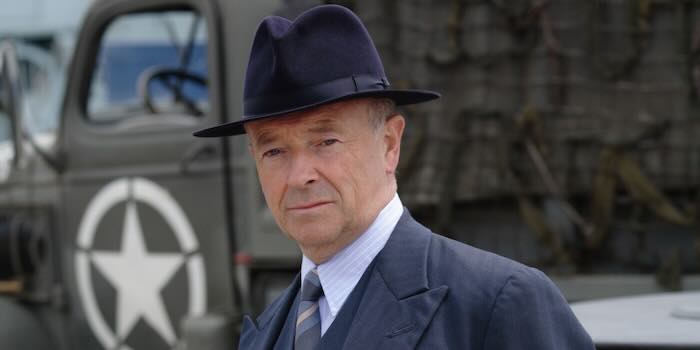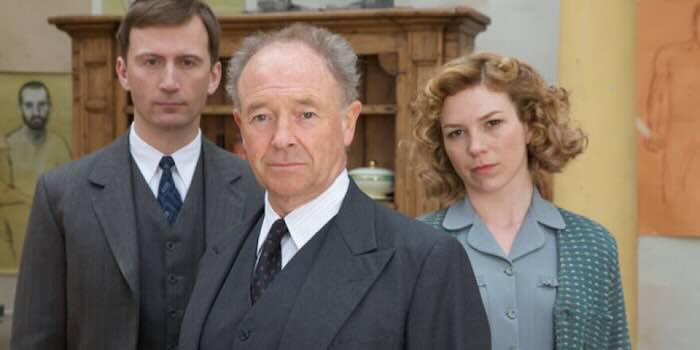By Dr. Bruce Smith ——Bio and Archives--January 24, 2024
HeartlandLifestyles | CFP Comments | Reader Friendly | Subscribe | Email Us

It has been quite a while since I began the process of writing a first column about remarkable screen performances. Being a sucker for well-crafted film and television productions, I’m easily drawn into the story. As with good fiction and historical writing, it’s easy to be pulled into a narrative and feel as though I’m there with the characters or actors. Actually, the skill level of the writers doesn’t have to be all that great, but there are times when the perfect combination of writing, acting, filmmaking, sets, costumes, and lighting comes together to produce an unforgettable experience for the viewer.
If you’re not familiar with ‘Foyle’s War’ you’re in for a rare treat. Michael Kitchen plays Christopher Foyle, a policeman in the south of England circa 1940. Foyle is a veteran of the Great War and a widower who has settled down to a quiet life of keeping order and investigating crime in the South Downs area of East Sussex. As the war begins, Foyle offers to transfer to a place where there is more serious crime about, but is denied. In this way the viewers begin to explore daily life in a quiet area away from London and the big cities of England. Because of the war and the efforts of the Germans just across the channel there are plenty of scenarios to build into episodes for the series.
The stories are straightforward. Foyle has a son Andrew (Julian Ovendon) who is an RAF Spitfire pilot. Foyle doesn’t drive, for unexplained reasons, then is assigned a driver from the motor pool, Samantha (Sam) Stewart, played by Honeysuckle Weeks, and an assistant, Paul Milner, played by Anthony Howell. Sam begins to help in small ways with Foyle’s investigations. There are episodes dealing with smuggling, petty theft, loyalty, profiteering, murder, and more, all set in the uncertain early days of the war.
The early seasons of the series are about Foyle’s activities leading up to and through the Battle of Britain in 1940. The later seasons take on a decided Cold War slant, picking up Foyle and Sam as the war ends with espionage and post war issues taking front and center. In my view, nearly every episode in the early seasons is masterful, but one particular episode is a favorite. Titled Fifty Ships, its background is the Lend-Lease deal between Churchill and FDR in which fifty mothballed destroyers from the era of the Great War are handed over to the Royal Navy.
The closer focus of the episode is made up of two memorable stories. The first is a tale of civilians assigned a kind of official second-responder job of going to sites of bombings and fires immediately after the first responders have put out the fires. They go in to assess damage and bring out the wounded and dead. One particular crew is led by a figure who turns out to be a bully who takes advantage of the misfortune of others to steal valuables. Foyle investigates these thefts and finds where the gang is hiding their loot. In scathing terms, Foyle addresses this heartless thug and his associates in a few satisfying sentences before they are led off in cuffs, worried about whether they will hang for their crimes.
The second memorable story in the episode is a tale of Foyle’s early life. Amanda Root plays the lovely, middle-aged Elizabeth Lewes, once the woman Foyle hoped to marry. Many years before, Elizabeth’s father had forbidden her from marrying Foyle, the mere son of a policeman, and not nearly good enough, in his mind, for his daughter.
Support Canada Free Press

Foyle married another who gave him a family and a loving home. Foyle still mourns his wife. Elizabeth married another, too, but her relationship with her husband leaves something to be desired. As part of his duties, Foyle must attend a dinner at their house. In a quiet moment, Elizabeth lets her feelings for Foyle escape, leaving him with a heartrending moral dilemma. If you have ever lost a love or have known someone who has, this story will touch you deeply.
I don’t know how the writers and actors do it. I can tell myself over and over that it’s just a movie, but Foyle’s understated expressions and telling looks bring me to the point of being so involved in the story that I’m caught up in the emotion, the longing, and the drama of their lives. It just can’t be helped. The terms masterful and stunning do not seem quite adequate to describe what was captured on film.
‘Foyle’s War’ is available on Acorn TV, home to many great British dramas. If you, dear reader, can find a way to see the series, be sure to do so. If the whole series is available, start at the beginning. Fifty Ships is Season 2, episode 1. The first season will supply the viewer with context and background, making the episode all the richer. Having seen the entire series four or more times, I always look forward to this episode. I hope it becomes a favorite of yours.

View Comments
Dr. Bruce Smith (Inkwell, Hearth and Plow) is a retired professor of history and a lifelong observer of politics and world events. He holds degrees from Indiana University and the University of Notre Dame. In addition to writing, he works as a caretaker and handyman. His non-fiction book The War Comes to Plum Street, about daily life in the 1930s and during World War II, may be ordered from Indiana University Press.